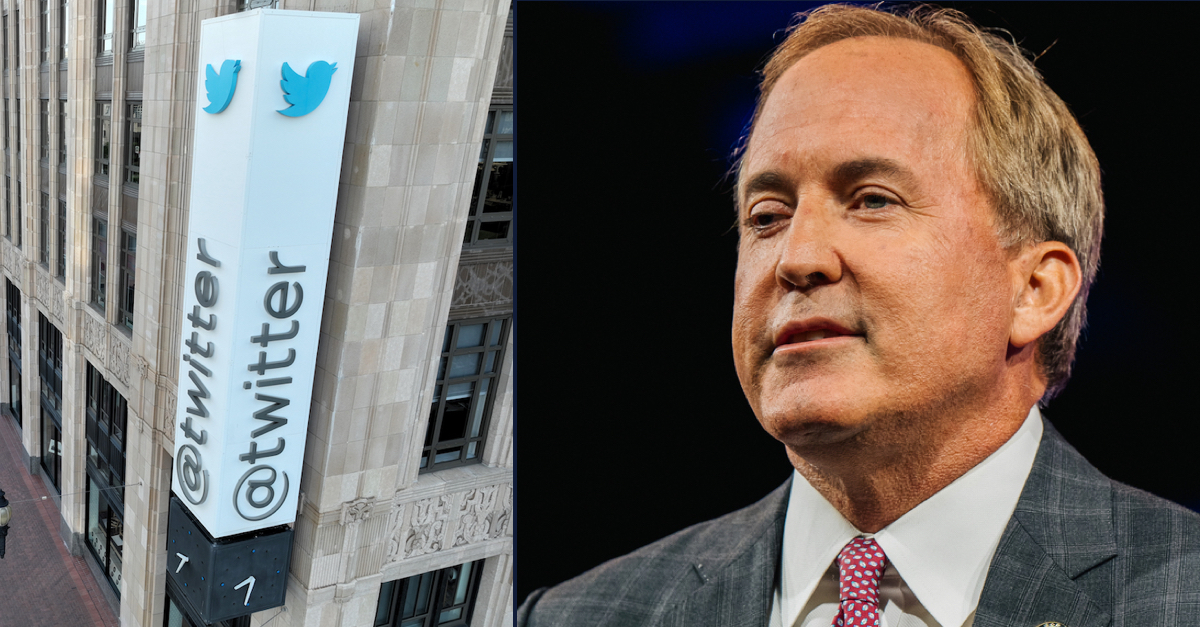
Twitter headquarters in San Francisco, Calif. (right)
In a defeat for Texas Attorney General Ken Paxton (R), the Supreme Court on Tuesday revived an injunction blocking the Lone Star State’s top prosecutor from enforcing a law that prevented social media companies from banning content they find harmful.
Some conservatives have described Texas’s H.B. 20 as an anti-“censorship” law, but its critics say that the statute itself stifles social media companies from exercising their First Amendment rights to moderate content without government interference.
“Texas’s HB 20 is a constitutional trainwreck—or, as the district court put it, an example of ‘burning the house to roast the pig,’” said Chris Marchese, counsel for NetChoice. “We are relieved that the First Amendment, open internet, and the users who rely on it remain protected from Texas’s unconstitutional overreach.”
Together with Computer and Communications Industry Association (CCIA), NetChoice was one of two trade organizations that sued Paxton over the law last year.
Late last year, U.S. District Judge Robert Lee Pitman, a Barack Obama appointee, agreed with the trade groups that the law violated their First Amendment rights and granted an injunction blocking it.
A divided panel of conservative U.S. Court of Appeals for the Fifth Circuit put a stay on that injunction in an unexplained 2-1 decision earlier this month.
The Supreme Court’s ruling reinstated Pitman’s order pending further arguments on the merits—with a split that generated an unusual lineup. The majority included Chief Justice John Roberts and Associate Justices Stephen Breyer, Sonia Sotomayor, Brett Kavanaugh, and Amy Coney Barrett. Justice Elena Kagan would have denied the application to vacate the stay.
Neither Kagan nor the majority explained their reasoning.
Justice Samuel Alito, joined by Clarence Thomas and Neil Gorsuch, wrote a dissent.
READ RELATED: Olivia Lois Ortz Sexually Abused Student: Police
“This application concerns issues of great importance that will plainly merit this Court’s review,” their dissent reads. “Social media platforms have transformed the way people communicate with each other and obtain news. At issue is a ground-breaking Texas law that addresses the power of dominant social media corporations to shape public discussion of the important issues of the day.”
Alito noted that the majority could not have reached that outcome without finding that the trade groups were likely to succeed on the merits. He said that question is not clear.
“It is not at all obvious how our existing precedents, which predate the age of the internet, should apply to large social media companies, but Texas argues that its law is permissible under our case law,” he wrote.
NetChoice’s counsel predicted that his client would continue to prevail in the lower courts.
“Despite Texas’s best efforts to run roughshod over the First Amendment, it came up short in the Supreme Court,” Marchese said in a statement. “HB 20 will once again be enjoined and the case will proceed in the lower courts.”
“Given the district court’s well-reasoned conclusion that Texas’s law is so constitutionally flawed that it must be enjoined in its entirety, we are confident the courts will likewise strike it down in its entirety,” he added.
This is a developing story.
Read the Supreme Court’s ruling and dissent below:
(Image of Twitter via Justin Sullivan/Getty Images; Photo of Paxton by Brandon Bell/Getty Images)
Have a tip we should know? [email protected]
Source:





